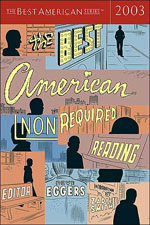…a transcribed discussion of Nicholson Baker’s “The Charms of Wikipedia,” which appeared in The New York Review of Books.
[In a piece that’s more essay than book review, Baker probes the workings of Wikipedia and its implications for how we manage and interpret knowledge in the Internet age. Baker’s tone is lighthearted and earnest and he charts the lines delineating what’s to be considered worthy of inclusion (and what’s not) in the largest repository of information in the history of humankind.]
Joseph: I liked it. It was funny. I thought it had a lot of humor in it and I liked that, it was a nice touch. It didn’t take itself too seriously. And it kept me engaged, it kept me entertained. And Wikipedia’s something we’re all familiar with so I think it’s pretty relevant.
Sophia: Do you use Wikipedia?
Joseph: I usually go to Wikipedia for basic research and then check up on what Wikipedia’s saying. I’ve found some things on there that aren’t true. Our teachers discourage using it.
Elizabeth: Yeah ours just say don’t even go there, it’s not good enough to use.
Laura: Wow, that’s crazy. My school’s not so strict. My history teacher even encourages us to follow the references Wikipedia has. That’s what it’s best for I think. I think that’s what [Baker’s] saying about not throwing out articles so zealously. Why throw something away? You should just know it’s not gospel.
Elizabeth [shrugging]: For us [the teachers] pretty much discourage it in general.
Nina: But I heard this study that compared Encyclopedia Brittannica to Wikipedia and found that they’re wrong the same number of times. They’re not that different.
Joseph: And all the editing at Wikipedia’s so controlled. Maybe too controlled. Actually it’s kind of too bad how tight they manage things. I think that’s what he’s saying here: it’s not even that open anymore. It’s weird how you can’t necessarily get editing access even to an entry about yourself.
Will: He really explains that stuff well. I like this piece because the thing about Wikipedia is that it’s so huge, it’s such a big part of pop culture right now, but also it’s going to have a lasting impact on our society. I guess I just think this piece would be cool to have in because Wikipedia’s something that was obscure really recently but is so huge now. It’s kind of a turning point. People don’t really trust Wikipedia yet but it’s here to stay. So to have someone sit down and put some sense to it, and really think about it like Baker does, that’s cool.
Nina: I like how he talks about saving articles from the abyss.
Sophia: Yeah, I really liked that kind of stuff too.
Eli: And I mean, when else are you going to be able to write about Wikipedia except in a random book review? This is still something that could be written about and people could give a damn about later I think, even after the book he’s reviewing’s been forgotten. And the substance was interesting. I learned things. Like the Article Rescue Squadron. I was engaged with that. It’s crazy how open to abuse Wikipedia is, which is I guess why it has to be edited. It has to be closely regulated, anyone can do anything.
Sophia: The whole Internet’s that way.
Joseph: Yeah like on YouTube, anyone can say anything. These debates pop up and they’re usually on the most pointless topics. I’ve seen real death threats and stuff in the comments on YouTube. Or you’ll see people debating about World War II and Nazis. All from, say, a video of a cat walking down a staircase.
Nina: Yeah but the people in my life whose opinions I value aren’t posting YouTube comments. So I don’t think those comments sections are accurate portrayals of the general population.
Joseph: I guess it could be a small percentage of nutty people.
Sophia: People know they’re not accountable so they can say anything.
Nina: I’m most weirded out by people who are like “Today was a rough day, Jimmy just broke up with me.” People who have to write that online all over the place.
Eli: The way I was raised is, it’s like certain parts of the neighborhood, you just don’t go there. Just use common sense. I think that’s what [Baker’s] talking about here: just having common sense about believing or not what we read. Taking things with a grain of salt, but not throwing the baby out with the bath water. Not getting rid of what’s good about Wikipedia just because some people abuse it.
Subscribe to:
Post Comments (Atom)









No comments:
Post a Comment